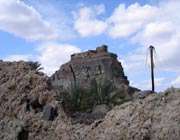
The March to Khaybar
The truce the holy Prophet had made with Mecca now made it possible to concentrate on the dangers which lay to their north. The greatest of these was the town of Khaybar, occupied by Jews who were for the most part implacably hostile to Islam.
The sorcerer Labid had almost certainly been bribed from there, though that could have been the work of an individual. But there were far more evident and general reasons for taking action against the exiled Bani Nadir and their Khaybarite kinsmen. Not that they were likely to invade Yathrib.
Except for one or two men, they had not taken any direct part in the campaign of the Trench, but it was they who had given Quraysh every encouragement to attack, and it was their influence which had induced their allies of Ghatafan to side with Quraysh on that occasion.
It was also largely through them that Ghatafan still remained virtually at war with the oasis. Medina could never know any fullness of peace while Khaybar remained as it was.
It had long been clear that something must be done, sooner or later, in that direction; and now the time had come, for the Prophet was certain that the near victory promised in the recent Revelation - a victory which would moreover be rich in spoils - could be nothing other than the conquest of the Jewish stronghold of Khaybar.
But this was not to be shared by all who professed Islam. The Revelation made it clear that those Bedouin who had failed to respond to his summons to make the Lesser Pilgrimage had been largely prompted by mercenary motives.
Since there was no hope of plunder on the Pilgrimage, it was not worth the effort. They were therefore not to be allowed to take part in the conquest of what was, without doubt, one of the richest communities in all Arabia.
This meant setting off with a smaller force, though it had the advantage that their plans could be kept secret until the last moment. But even when the project became known, it was passed from mouth to mouth as a pleasantry rather than a fact. The impregnable strength of Khaybar was almost proverbial.
Quraysh and the other enemies of Islam hoped that the news was true because, if so, Mohammad would at last receive a crushing defeat; but they feared it could not be true, for they knew he was not mad.
As for the men of Khaybar themselves their confidence was such that they refused to believe it. They did not even trouble to ask their allies for help until certain news came from Medina that Mohammad was about to set forth.
Only then did Kinanah, their virtual chief, make a speedy visit to Ghatafan, offering them half the date harvest for that year if they would send them reinforcements. The Ghatafan agreed to do so and promised a force four thousand men.
The Jews of Khaybar were in the habit of donning their armour every day and lining up their full strength of fighting men, ten thousand in all. The help of Ghatafan would bring the number up fourteen thousand; and according to the news from Medina, the invading army was of sixteen hundred men only.
Before the Prophet set out, one of the men of Aws known as Abu Abs came to him with a problem. He had a camel to ride, but his clothes were rags and he had no means of procuring any provisions to take on the march and nothing to leave for the upkeep of his family, let alone buying himself new garment.
There were many others in similar circumstances, though this was an extreme case. But much had been spent on the Pilgrimage, and everything that had been gained so far in the way of spoil was outweighed by the increasing number of poverty-stricken converts who came Medina from every direction.
The Prophet gave Abu Abs a fine long cloak all that was available for the moment; but on the march, a day or two later he noticed that he had on a much poorer cloak and he asked him:
"Where is the cloak I gave thee?"
Abu Abs replied,
"I sold it for eight dirhams. Then I bought two dirhams worth of dates as provision for myself, and left two dirhams for my family to live on, and bought a cloak for four dirhams."
The Prophet laughed and said:
"O father of Abs, thou and thy companions are poor indeed. But by Him in whose hand is my soul, if ye keep safe and live yet a little while, ye shall have abundance of provision and leave abundantly for your families. Ye shall abound in dirhams and slaves; and it will not be good for you!"
At one point on the march, between two camps, the Prophet halted army and called to a man of Aslam known as Ibin Al-Akwa, who had, as he knew, a beautiful voice.
"Dismount, and sing us a song of camel songs."
The Bedouin would sing to their camels as they rode from place to place. They would chant poems to old melodies, monotonous, haunting and plaintive; and to the sadly serene cadences of one of these Ibin Al-Akwa now chanted some words which the Prophet had taught the while they were digging the trench:
"God, but for Thee we never had been guided, Never had given aims, nor prayed Thy prayer."
So it began; and when he had finished the Prophet said to him:
"God have Mercy on thee."
One of the companions noted:
"Thou hast made it inevitable, O Messenger of God. Would thou hadst let us enjoy him longer!"
He meant, as they all knew, that the Prophet had foretold his early martyrdom, for they had come by experience to conclude that when he invoked Mercy upon anyone, that person had probably not long to live.
Source: alhassanain.com
نظرات شما عزیزان:



